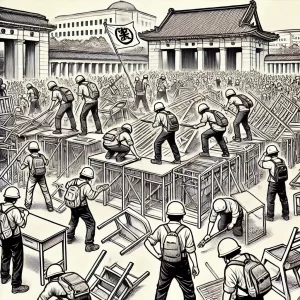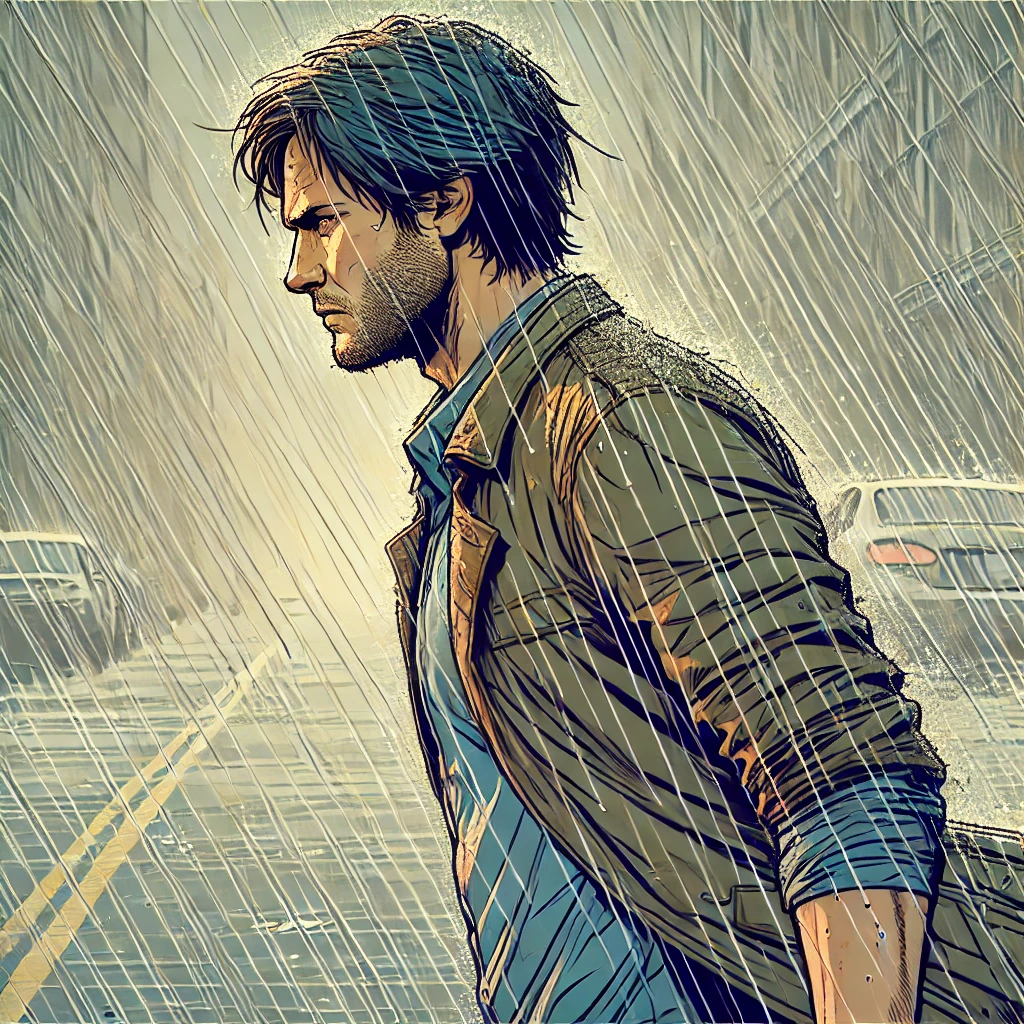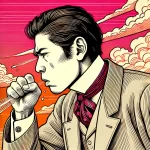傘がない [Kasa ga Nai]
井上陽水 [INOUE Yōsui]
Words & Music : 井上陽水 [INOUE Yōsui]
“Kasa ga Nai” is a song included in Yosui Inoue‘s debut album “断絶 / Danzetsu,” released in 1972. Although it didn’t hit the charts initially, its lyrics were intriguing enough to spark controversy and make it one of his signature songs.
Yosui Inoue has many hit songs, and his lyrics are often avant-garde and profound.
都会では 自殺する若者が増えている
tokai dewa jisatsu suru wakamono ga fuete iru
今朝来た新聞の片隅に書いていた
kesa kita shinbun no katasumi ni kaite ita
- 都会(とかい) [tokai] : city
- 自殺(じさつ) [jisatsu] : suicide
- 若者(わかもの) [wakamono] : young people
- 増える(ふえる) [fueru] : increase
- 今朝(けさ) [kesa] : this morning
- 新聞(しんぶん) [shinbun] : newspaper
- 片隅(かたすみ) [katasumi] : corner
- 書く(かく) [kaku] : write
(translation) “In the city, the number of young people committing suicide is increasing.
It was written in the corner of this morning’s newspaper.”
The shocking word “suicide.” It’s realistic, and its sound is not beautiful at all, but this might be the style of the folk genre.
In 1972, when this song was released, the “Asama-Sansō incident wiki,” often considered the last student movement in Japan, occurred. Student movements are social and political actions carried out by students. In the late 1960s, these movements were prominent not only in Japan but also in countries like China, France, and the United States. However, by the 1970s, this trend had waned, and this year marked its decline. There were many dark events that year, which may have led to an increase in suicides.

だけども問題は今日の雨 傘がない
dakedo mo mondai wa kyō no ame kasa ga nai
- だけど [dakedo] : but
- 問題(もんだい) [mondai] : problem
- 今日(きょう) [kyō] : today
- 雨(あめ) [ame] : rain
- 傘(かさ) [kasa] : umbrella
- ない [nai] : not exist
(translation) “But the problem is today’s rain. There’s no umbrella.”
In Japanese, there is no structure like “There is” in English. Instead, adjectives like “ある / aru” (=exist) or “ない / nai” (=not exist) are used. “傘がない / Kasa ga nai” can be translated as “There’s no umbrella” or “I don’t have an umbrella.”
行かなくちゃ 君に逢いに行かなくちゃ
ikanakucha kimi ni aini ikanakucha
君の町に行かなくちゃ 雨にぬれ
kimi no machi ni ikanaku cha ame ni nure
- 行く(いく) [iku] : go
- 君(きみ) [kimi] : you
- 逢う(あう) [au] : meet
- 町(まち) [machi] : town
- 濡れる(ぬれる) [nureru] : get wet
(translation) “I have to go, I have to meet you.
I have to go to your town, getting wet in the rain.”

つめたい雨が 今日は心に浸みる
tsumetai ame ga kyō wa kokoro ni shimiru
君の事以外は考えられなくなる
kimi no koto igai wa kangaerarenaku naru
それはいい事だろう?
sore wa ii koto darō?
- 冷たい(つめたい) [tsumetai] : cold
- 心(こころ) [kokoro] : heart
- しみる [shimiru] : penetrate
- 事(こと) [koto] : thing
- 以外(いがい) [igai] : except
- 考える(かんがえる) [kangaeru] : think
- それ [sore] : that
- いい [ii] : good
(translation) “The cold rain seeps into my heart today.
I can’t think of anything but you.
Is that a good thing?”
“Social issues,” “rain,” “I have to go meet you.” It can be puzzling to see how these are connected.
While it’s often explained as a song depicting a devoted love that prioritizes “you” over social issues, I don’t want to confine Yosui Inoue’s song to such a formulaic interpretation. After all, the main issue here is that “there’s no umbrella.”
テレビでは 我が国の将来の問題を
terebi dewa wagakuni no shōrai no mondai o
誰かが深刻な顔をして しゃべってる
dareka ga shinkokuna kao o shite shabette ru
だけども 問題は今日の雨 傘がない
dakedo mo mondai wa kyō no ame kasa ga nai
- テレビ [terebi] : TV
- 我が(わが) [waga] : our
- 国(くに) [kuni] : country
- 将来(しょうらい) [shōrai] : future
- 誰か(だれか) [dareka] : someone
- 深刻な(しんこくな) [shinkokuna] : serious
- 顔(かお) [kao] : face
- しゃべる [shaberu] : talk
(translation) “On TV, someone with a serious face is talking about our country’s future issues.
But the problem is today’s rain. There’s no umbrella.”
行かなくちゃ 君に逢いに行かなくちゃ
ikanakucha kimi ni aini ikanakucha
君の家に行かなくちゃ 雨にぬれ
kimi no uchi ni ikanaku cha ame ni nure
- 家(いえ) [ie / uchi] : house
(translation) “I have to go, I have to meet you.
I have to go to your house, getting wet in the rain.”
つめたい雨が 僕の目の中に降る
tsumetai ame ga boku no me no naka ni furu
君の事以外は何も見えなくなる
kimi no koto igai wa nanimo mienaku naru
それはいい事だろう?
sore wa ii koto darō?
- 目(め) [me] : eye
- 降る(ふる) [furu] : fall
- 見える(みえる) [mieru] : see
(translation) “The cold rain falls into my eyes.
I can’t see anything but you.
Is that a good thing?”
At the very least, Yosui Inoue seems to think it’s foolish to participate in something like a student movement without thinking. Beyond that, it’s his artistic expression. Everyone, please don’t think; just feel.
This article is a revised blog version for 2024. The video version is below.
Thanks for reading! Feel free to comment if you have any feedback or questions.
Follow me on X.



